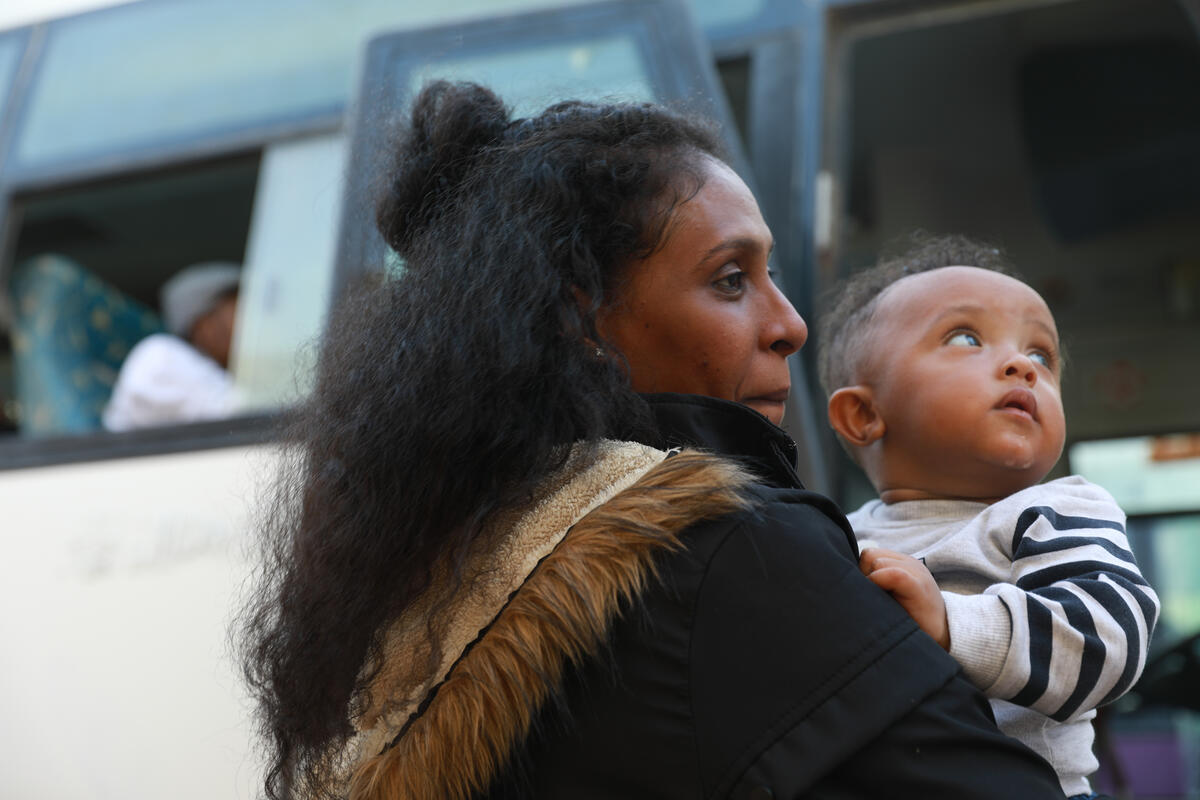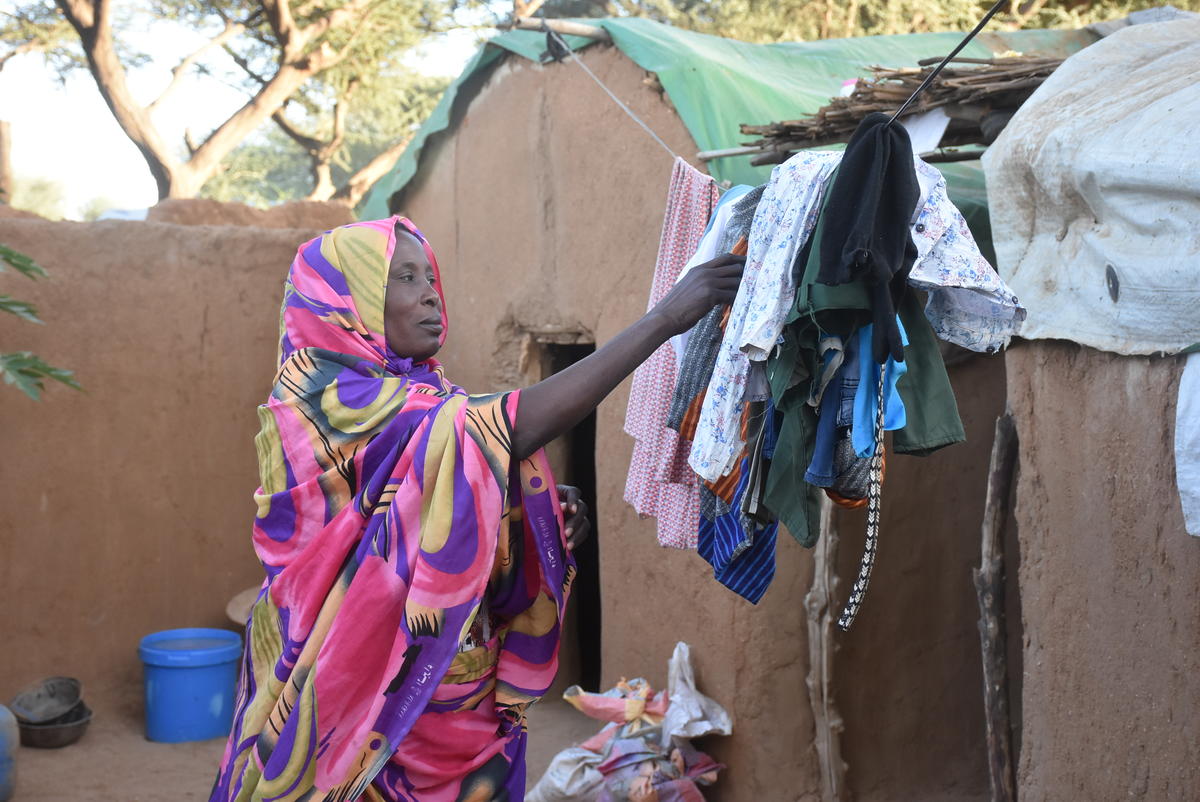UNHCR recalls staff from Chad border after air strikes in Darfur
UNHCR recalls staff from Chad border after air strikes in Darfur

ABECHE, Chad, February 19 (UNHCR) - The UN refugee agency on Tuesday morning recalled staff from a section of eastern Chad's border with Sudan after earlier air strikes against targets just across the frontier in West Darfur.
The nine staff members were caring for newly arrived Sudanese refugees in the Birak area. "It is extremely frustrating to have to withdraw staff from the border.... It is not only sad, but frustrating, because we cannot provide the protection assistance we wish to give to these newly arrived refugees," said Jorge Holly, head of the UNHCR field office in the eastern Chad town of Guéréda.
"I want to send my staff back to the border as soon as the security situation allows; there is so much we have to do for these people," Holly added.
The team left hours after a group of seven Sudanese refugees from West Darfur turned up at Birak health centre and asked the UNHCR staff for help. The refugees were carrying a 55 year-old woman whom they said had lost both her legs during an air raid Monday by Sudanese Antonov planes on the Aro Sharow camp for internally displaced people (IDPs) in West Darfur. She later died.
One of the refugees told UNHCR protection officers in Birak that the planes started bombing the site at about 10 in the morning. "We counted 18 bombs in total, six directly into the IDP camp," the refugee reportedly claimed.
UNHCR staff in Birak heard bomb explosions coming from Sudan on Monday. "This morning's bombing was a terrible experience," said a UNHCR protection assistant, one of the nine called back to Guéréda. "We could hear them fall and we felt the battle on the ground. It was so close."
There are normally 4,000-5,000 IDPs at Aro Sharow, but there are unverified reports that most had fled after bombings around Abu Suruj, Sileah and Sirba in West Darfur earlier this month. The refugees who carried the injured woman to Birak said more people would now be fleeing to Chad.
As of yesterday, refugees from Darfur were still crossing into Chad. Some of those who arrived a week ago told UNHCR protection staff that over the past few days they had tried to go back at night to Sileah and Sirba to collect food they had buried to prevent it from being looted. "We wanted to go back to collect our food, but we were stopped by the Sudanese military," a female refugee alleged.
Others claimed that young women were being forcibly prevented from leaving Sirba and Sileah since the recent attacks started on February 8, causing an estimated 10,000 people to flee across the border into eastern Chad.
The UN refugee agency on Tuesday reiterated a call for the new arrivals to be relocated away from the border to safer areas deeper inside Chad. "For protection and security the refugees need to be moved urgently away from the border. We are still discussing the transfer to existing camps near Guéréda with the Chadian authorities," spokeswoman Jennifer Pagonis said in Geneva.
"The women and children we talked to want to be moved to safety, they want to be transfered to a camp," added the protection assistant in Guéréda.
Before the latest development, UNHCR successfully conducted an assessment mission at the weekend to the Birak and Korok areas to locate newly arrived refugees from West Darfur. The refugee agency now estimates there have been at least 10,000 new arrivals since February 8.
Most of the refugees are in Figuera, with smaller numbers in Birak, Djange and Korok. Several children were reunited with their families in Figuera after earlier being separated from their kin. Refugees in the town took the children into care and put out the word that they were safe and could be collected.
UNHCR is registering vulnerable cases such as unaccompanied and separated children, pregnant women, the elderly and sick refugees. Some cases have been transferred to the hospital in Guéréda. The agency is also interviewing women who have suffered sexual abuse.
Some refugees have brought supplies with them from Sudan, others have nothing. The majority of the new arrivals had already been internally displaced in West Darfur.
On the other side of Chad in neighbouring Cameroon, meanwhile, UNHCR on Saturday began moving Chadian refugees from the Madana transit site in the border town of Kousséri to Maltam 1 camp, located 35 kilometres away.
So far, some 1,400 refugees have been transported to the new camp. They were among up to 30,000 Chadians who fled fighting earlier this month in the streets of the Chad capital, N'Djamena, between government troops and rebels.
A pre-registration exercise undertaken on Saturday by UNHCR teams and the Cameroon Red Cross showed that 13,000-15,000 people want to be relocated to Maltam 1. Refugees said they still did not feel it was safe to return to N'Djamena. Chad declared a state of emergency last week following the unrest.
By Annette Rehrl in Abéché, Chad








